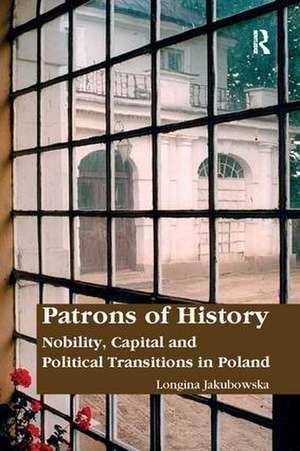Patrons of History: Nobility, Capital and Political Transitions in Poland
Autor Longina Jakubowskaen Limba Engleză Paperback – 22 mai 2017
| Toate formatele și edițiile | Preț | Express |
|---|---|---|
| Paperback (1) | 416.22 lei 6-8 săpt. | |
| Taylor & Francis – 22 mai 2017 | 416.22 lei 6-8 săpt. | |
| Hardback (1) | 1111.72 lei 6-8 săpt. | |
| Taylor & Francis – 28 iun 2012 | 1111.72 lei 6-8 săpt. |
Preț: 416.22 lei
Nou
Puncte Express: 624
Preț estimativ în valută:
79.65€ • 82.85$ • 65.76£
79.65€ • 82.85$ • 65.76£
Carte tipărită la comandă
Livrare economică 15-29 aprilie
Preluare comenzi: 021 569.72.76
Specificații
ISBN-13: 9781138110021
ISBN-10: 1138110027
Pagini: 248
Dimensiuni: 156 x 234 mm
Greutate: 0.45 kg
Ediția:1
Editura: Taylor & Francis
Colecția Routledge
Locul publicării:Oxford, United Kingdom
ISBN-10: 1138110027
Pagini: 248
Dimensiuni: 156 x 234 mm
Greutate: 0.45 kg
Ediția:1
Editura: Taylor & Francis
Colecția Routledge
Locul publicării:Oxford, United Kingdom
Notă biografică
Longina Jakubowska is Anthropology Fellow at University College Utrecht, Utrecht University, The Netherlands.
Recenzii
Awarded the BASEES George Blazyca Prize in East European Studies, 2013 'In this compelling ethnography of the charm, sensibilities, and horror of a bygone era, Jakubowska brings to life the lasting tale of the Polish gentry. This extraordinary book addresses not only how this nobility has read and interpreted its own history, but also how others continue to be fascinated by the sheer allure of their habitus. Here we are provided with both a record and an explanation as to how the history of a class is transformed, made magical, and instantiated in the popular imagination of the nation in a way that is at times, "natural" and at times "manipulative." Bourdieu is surely smiling on this ethnography.' Donna M. Goldstein, University of Colorado, Boulder, USA 'Over centuries the Polish szlachta has skillfully fused familial identities with those of the Polish nation and Western civilization, but Jakubowska illuminates the class and even racial dimensions of noble myth-making. The continuing magic of the old surnames suggests that Polish social structure has more in common with other old countries in Western Europe than with postsocialist neighbours in the East. Jakubowska's sensitive analysis of these carriers of the national memory is a fine study in historical anthropology, rich in implications for both theory and method.' Chris Hann, Max Planck Institute for Social Anthropology, Germany 'This is an extraordinary book - undoubtedly one of the most important works on Poland to be written in recent years. Although the author is an anthropologist, this should be essential reading for historians as well, because of both the subject matter and the methodological approach... The goal of this book is not merely to debunk the historical memory of the Polish gentry, but to show how their own sense of identity has shaped that memory (and vice versa). This matters, because their strong position among the educated elite has ensured that their version of the past has set the con
Cuprins
Chapter 1 The Class that Would Not Perish; Chapter 2 Historical Capital; Chapter 3 Positioned Histories; Chapter 4 Land Reform and the Dismantling of a Class; Chapter 5 On Trial: 1947–1956; Chapter 6 Noble Silence; Chapter 7 The Endurance of Prestige;
Descriere
Drawing on rich interview material spanning fifteen years, Patrons of History sheds light not only on communism as it existed and the stratification that persisted under such regimes, but also on the functioning of relationships of power and the ways in which privilege can be studied in the contemporary world. As such, this book will appeal to anthropologists, sociologists, ethnographers and historians interested in cultural and social capital, inequality and resistance.














